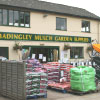Organic or Inorganic Mulch – Which is Best for Your Garden?
The beneficial properties of mulch are well known; however, there are plenty of choices when it comes to adding it to your flower beds or other parts of your garden. One of the principal decisions you will have to make is to choose between organic or inorganic varieties. Here, bark mulch suppliers Madingley Mulch, who serve customers in Essex, Suffolk and our home county of Cambridgeshire, look at the advantages both types offer.
The Types Defined
Organic mulch is defined as a layer of material derived from living or once-living organisms, that is spread on the surface of the soil. Sometimes known as biodegradeable mulch, it usually contains material such as well-rotted manure, bark, leaves, straw, pine needles and other composts.
Inorganic mulch is defined as any material applied to the soil surface that is not derived from living organisms and does not decompose (or does so extremely slowly) over time. Also known as non-biodegradeable mulch, this can include decorative stones (including rocks, cobbles and pebbles), plastics and geotextiles. At Madingley Mulch, we also stock decorative garden stones at our base on the outskirts of Cambridge.
Advantages of Organic Mulch
Organic mulch improves the structure of the soil – as they decompose, they release their nutrients into the ground. This is particularly important in most gardens in the east of England, as they are very likely to have a clay soil which doesn’t produce good growing conditions for many plants – it’s slow to drain and can easily become waterlogged.
Organic mulch also suppresses weeds by not allowing them to germinate, and helps the soil retain more moisture, which is important during long, hot dry spells, like we are experiencing at the moment.
It’s comparatively lightweight (particularly in relation to some of the bigger decorative stones) and easy to work with.
Advantages of Inorganic Mulch
Inorganic mulch has many of the same properties as its organic counterpart in that it will suppress weeds, and also help the ground retain more moisture (although it won’t improve the soil’s structure, and, in the case of some plastic coverings, may actually harm the soil).
It is low-maintenance and won’t need replacing as often compared to organic varieties, which ideally should be replaced or topped up at least once a year to ensure the maximum amount of nutrients are released into the soil.
You can still grow plants in non-biodegradeable mulch – such as Mediterranean varieties like rosemary and lavender, and succulents such as sedum; none of them will need watering very much.
Inorganic mulch is also extremely versatile – not only can decorative stones be used in flower beds, but on pathways (pictured) and driveways as well, where you don’t want weeds sticking through. You will know when you have visitors because of the noise it makes underfoot. Additionally, decorative stones can be used to ‘level off’ parts of the garden – for example, by creating a rockery.
It’s also aesthetically pleasing – the larger stones, pebbles and cobbles are quite striking and really make your garden stand out.
Organic and Inorganic Mulches from Madingley Mulch
If you need mulch for a conventional flower bed, then organic types are probably better. We stock plenty of organic mulches at Madingley Mulch – including our barks and mulches, while our soils, conditioners and composts have much the same effect. These include our exclusive products Denise’s Delight and Tony’s Tonic.
However, if your garden gets a lot of sun, you don’t have much time (or money) to devote to it, or need a new driveway or pathway, then inorganic mulch has plenty of advantages too. Click here to see our range of decorative stones, pebbles and cobbles.
All our decorative aggregates are available in half cubic metre bulk bags with many available in smaller quantities. They can also be delivered as loose loads to homes, building sites or commercial premises by arrangement. You can find more details of our delivery arrangements here.
Back to blog





